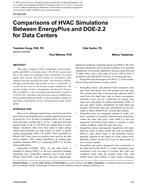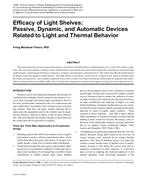The study presents a transient thermal model for the assessment of mixed-mode cooling in buildings with hybrid ventilation and high levels of exposed thermal mass. The model is based on the thermal network representation for a building that can capture the non-uniform surface and air temperature distribution within a building space considering smaller simulation sub-zones. Advective heat transfer associate with air flow is used for computing the thermal exchange between air nodes in adjacent sub-zones. Two-dimensional heat conduction is considered to describe the horizontal and vertical heat transfer within the massive floor slab. The model is validated with monitored data from an occupied institution building under real conditions. The heat removal from the building thermal mass by the cool air stream is close to 1.5 and 3.1 times higher with the air stream at an average temperature of 12°C (53.6°F) compared to that with an air stream at 15°C (f9°F) and 18°C (64.1°F) respectively. The night cooling operation hours and the selection of low temperature set-point have a significant impact on the following day’s cooling demand for the cases considered. The simulation results indicate the necessity for developing optimal model-predictive control strategies for building with mixed-mode cooling.
Product Details
- Published:
- 2012
- Number of Pages:
- 8
- File Size:
- 1 file , 4.7 MB
- Product Code(s):
- D-SA-12-C039
- Note:
- This product is unavailable in Russia, Belarus


